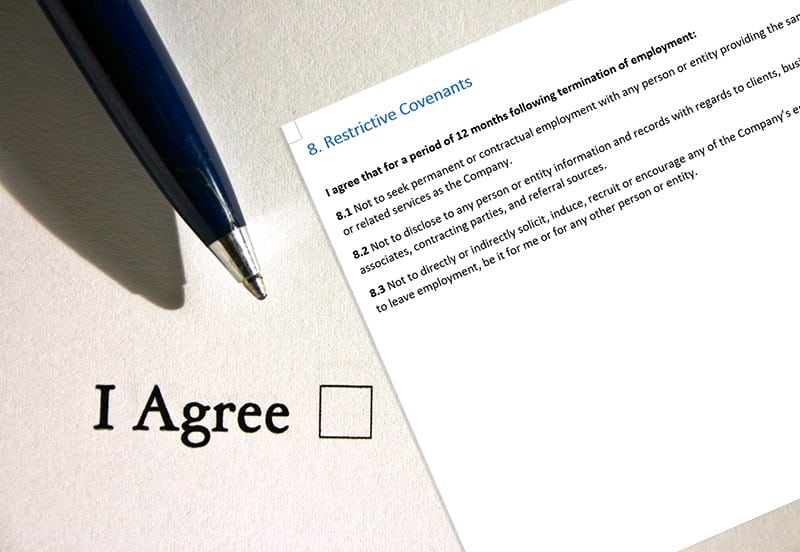6 Areas to Pay Attention to When Preparing an Employment Contract
Starting on the right foot with your employees can help avoid disputes.

For most positions, a proper employment contract is the first step to a mutually rewarding relationship between employer and employee.
Actively avoiding misinterpretation and ambiguity are key during the preparation of any such contract. What you want to avoid is starting the relationship on the wrong foot. Such misunderstandings, more often than not, could result in lengthy legal disputes.
What is an employment contract?
In essence, an employment contract is a formal agreement that governs and defines a future working relationship between employer and employee.
Simply put, this all-important document encompasses job duties, responsibilities and remuneration—as well as the dos and dont’s.
Depending on the job position involved, such agreements could greatly vary in style and length. In general, though, the following details below are expected to be listed.
A typical employment contract includes:
- Job title and description
- Conditions of employment, if any (e.g. if an employee is expected to be able to regularly travel overseas)
- Starting date, and in the case of fixed-term positions, ending date
- Remuneration details, including mode and channel of payment
- Employee benefits, entitlements, etc.
- Legal obligations, if any
- Termination/Resignation information
- Restrictive clauses, if any
1. Clarity of expectations
While some linguists would claim that it is never entirely possible, you should still aim to be crystal clear in your expectations.
Tempting as it is, do not list your expectations using ambiguous language. When this is unavoidable, at least moderate your statements with fixed parameters.
For example, rather than “to achieve sales quotas,” include information on how such quotas might change over time, by what increments, and so on.
Specifics such as department assigned to, minimum work hours/days required, or secondary performance targets should also be concisely stated. Doing so not only gives the soon-to-be staff a peace of mind, it implies good organization and prevents thorny future arguments.
Lastly, brevity is not an excuse for vague statements. When a number needs to be added, put it down.

2. Awareness of national employment laws
All economies are regulated by national laws—laws that could result in lengthy litigation should you fail to observe them.
A basic example is how all staff are to be given a fixed number of paid leave and medical absences yearly.
Chances are that most potential staff already know about these standard entitlements; however, to avoid ambiguity, you should still mention the details based on a clear understanding of what local laws require.
While you’re at it, consider putting in information regarding compassionate leave, unpaid leave and so on. Given global developments, you might even want to address atypical work arrangements imposed by sudden legislation or needs, such as working-from-home during virus outbreaks.
In summary, what you want to prevent is being hounded by the law for denying assured employee rights.

3. Money matters
There are truly few matters in the world that are as touchy as money. If you aren’t clear about remuneration amounts and payment modes, you may immediately invite distrust from any staff, which could snowball into a cumbersome dispute.
As a guideline, the following should be clearly stated:
- Actual remuneration amount
- Frequency and dates of payment
- Mode of payment
- Whether your stipulated mode of payment incurs financial fees, and if so, who pays these fees
- Conditions for remuneration
- Conditions for bonus remuneration, if any (if bonus remuneration is tied to performance targets, be sure to highlight it)
- Staff claims procedures
It is not rare for employees to expect an entirely different amount of pay, and, when challenged, state that they were not briefed on the variables. Such arguments would inevitably get ugly.

4. Legal obligations
Bluntly put, all jobs carry some form of legal and ethical obligations.
Standard ones, such as your staff not simultaneously part-timing for competing organisations, are widely known or universally expected.
Depending on the position or the parties your company works with, your staff might also be required to sign certain legal agreements or declarations (e.g. a statement of no involvement with sensitive/risky industries).
The gist of it is to clearly indicate such obligations on the employment contract. Note too that the employee must understand that these obligations must be adhered to throughout the job, and not just temporarily.
A hazardous situation to avoid is you being forced to fire a staff because he or she is found “lacking”. If this happens, you could be accused of unfair termination. In order to prevent this scenario, be sure to read up on national laws.

5. The use of restrictive covenants
For reasons of competitiveness and confidentiality, many companies include restrictive covenants in their employment contracts.
These covenants are clauses that forbid employees from engaging in activities deemed harmful to the employer after leaving the job, such as working for a competing firm or poaching ex-colleagues.
Necessary as such covenants might be from a business viewpoint, they are still frowned upon, as they could damage an ex-staff’s future career prospects.
In addition, they might not be realistically enforceable. It is common for such clauses to be voided in the event that they result in the inability for an ex-staff to secure new gainful employment. If an ex-staff claims to be working for a competitor under this scenario, do you have the means to debate the matter in court?
In short, if you must include restrictive covenants, be equipped with the means to seek redress if the worst happens. Be knowledgeable about ethical boundaries to observe when phrasing them too.

6. Termination of employment
The ugly truth is that many employment disputes involve not what happened during the job, but how the working relationship ended.
Common areas of dispute in this area include:
- Whether circumstances for termination were fulfilled, i.e. wrongful dismissal
- The notice period served by either party
- Severance packages and penalties
Needless to say, these disputes ultimately boil down to what was contractually agreed upon in writing.
As an employer, you could minimise the risk of such confrontations by clearly describing the process for termination, including specifics such as the notice period and reassignment of duties.
On the flip side, resignation procedures must also be properly indicated, with the actual details in accordance with above-mentioned national laws.
Most importantly, be extremely concise about the conditions for immediate termination. You do not want to be forced to heavily compensate an ex-staff, just because you told him or her to leave the office immediately.
If you have unfortunately gotten yourself tangled up in an employment dispute, finding an experienced and trustworthy law firm to mitigate or seek redress is crucial for you and your business.

Is being so specific in employment contracts beneficial for employers?
Let’s address the elephant in the room: is it truly beneficial for companies to be utterly upfront when preparing employment contracts? Doesn’t this hinder company flexibility?
Long story short, you should still do it to safeguard yourself and your business, although it may feel restrictive at times.
Unfortunately, there will always be individuals who promise you the moon and the stars during their interviews but ultimately deliver nothing. Worse still, some might even exploit your business and profitability.
Either that, or it could be a simple matter of misunderstandings left unaddressed.
Having a signed, well-written contract on hand gives you something to rely on when such unpleasant situations happen.
All else aside, employment contracts are an indication of professionalism. As the foundation of a new working relationship, a good contract can keep your employees reassured that there is no better ground to stand on.
Want to start drafting your own employment contract? Download this sample employment contract.
Explore More Content
Table of Content







